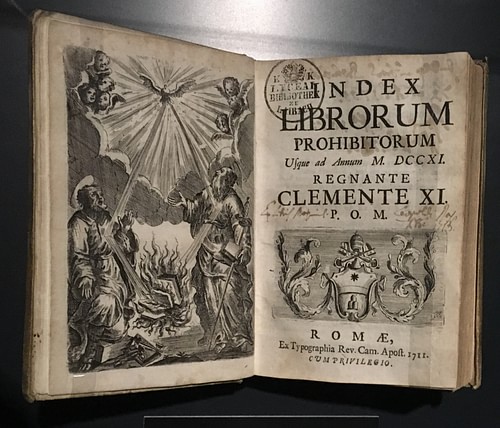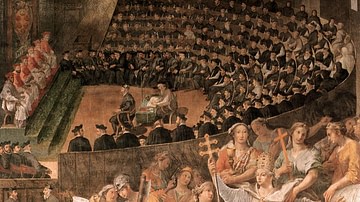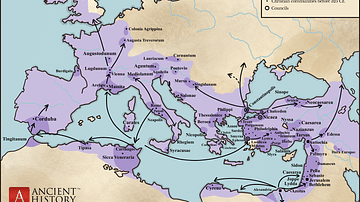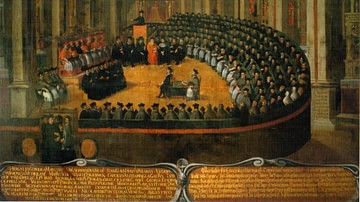The Index of Prohibited Books (Index Librorum Prohibitorum) was a list of written works condemned as heretical or injurious to the Christian faith by the Catholic Church at the Council of Trent in 1563. It remained in effect until 1966 when it was suspended, but Catholics were still expected to abide by its basic precepts.
The Council of Trent (1545-1563) was the first comprehensive effort by the Catholic Church to respond to the challenge raised by the Protestant Reformation (1517-1648). The Council effectively began what is known as the Counter-Reformation (also the Catholic Reformation, 1545 to c. 1700), which reestablished the authority of the Catholic Church. The Council of Trent decreed the Vulgate translation of the Bible as the only authoritative scripture, reformed abuses within the Church, clearly defined terms such as 'justification', 'sacraments' and 'penance', and condemned the Protestant Reformation as heresy.
The council met a total of 25 times between 1545 and 1563, and in the last sessions, they wrote the Index, which was ratified by the pope in 1564. Its purpose was to stop the spread of heresy and further challenges to the Church's authority by preventing the laity from reading, or hearing read, any work not expressly approved by the Church.
Background
The printing and dissemination of Martin Luther's 95 Theses was only the beginning of an onslaught of publications challenging the authority and validity of the Church. Prior to the invention of the printing press around 1440, books were handwritten, and copies were made through woodblock printing, which was time-consuming and so could produce only a few books in a given time frame. By the time of Martin Luther (l. 1483-1546), the printing press could produce more books in a week than woodblock printers could have even hoped to have achieved in over a month.
Between 1517, when he issued the 95 Theses, and 1522, Luther had produced and published many works attacking the Church, and these were followed by those of Huldrych Zwingli (l. 1484-1531), John Calvin (l. 1509-1564), and others. By 1545, when the Council of Trent convened, women – whose literary efforts had been effectively suppressed before – had published works under their own names and by their own authority. Argula von Grumbach (l. 1490 to c. 1564), Katharina Zell (l. 1497-1562), and Marie Dentière (l. c. 1495-1561), among others, had all published works critical of the Catholic Church or openly hostile to its claims, policies, and teachings.
The Church could not stop books from being printed, but they could prevent them from being read. The Index was not the first time the Church had initiated such a policy. Heretical writings were banned and destroyed by the medieval Church, and the works of proto-reformers such as John Wycliffe (l. 1330-1384) and Jan Hus (l. 1330-1415) were condemned and burned. The Index, first issued in 1559 under Pope Paul IV (served 1555-1559), differed from earlier attempts in that it was a systematic policy specifically naming works and authors condemned by the Church not only for heresy but for any deviation from officially sanctioned Church doctrine. At the Council of Trent, the earlier Index was revised and clarified in keeping with the model of the Council's decrees and canons to be as specific as possible so that no one could claim ignorance as an excuse for non-compliance.
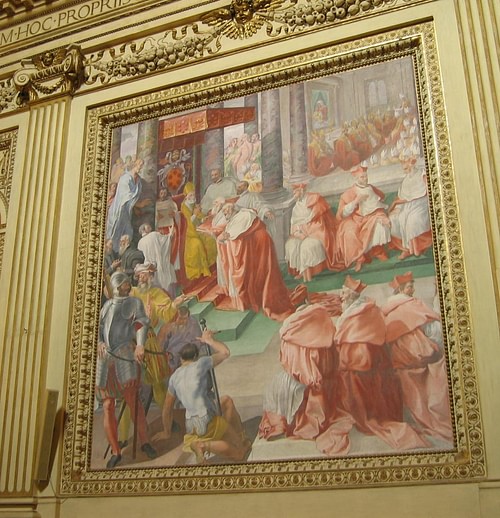
The Text
The following text is the 10-point introduction to the Index of 1563 taken from A Reformation Reader: Primary Texts with Introductions by Denis R. Janz, pp. 422-425, translated by H. J. Schroeder from his Canons and Decrees of the Council of Trent. The "biblia Vatabli" in Point III is a reference to the work of the French humanist scholar François Vatable (d. 1547), and Isidore Clarius in that same passage references Isidorus Clarius (d. 1555), who was one of the original delegates at the Council of Trent, but because he advocated for unity and discussion between Protestant and Catholic views in his writings, his preface and introduction to his translations were condemned and placed on the Index.
I: All books which have been condemned either by the supreme pontiffs or by ecumenical councils before the year 1515 and are not contained in this list, shall be considered condemned in the same manner as they were formerly condemned.
II: The books of those heresiarchs, who after the aforesaid year originated or revived heresies, as well as those who are or have been the heads or leaders of heretics, such as Luther, Zwingli, Balthasar, Friedberg, Schwenkfeld, and others like these, whatever may be their name, title or nature of their heresy, are absolutely forbidden. The books of other heretics, however, which deal professedly with religion are absolutely condemned. Those, on the other hand, which do not deal with religion and have, by order of the bishops and inquisitors been examined by Catholic theologians and approved by them, are permitted. Likewise, Catholic books written by those who afterward fell into heresy, as well as by those who after their fall returned to the bosom of the church, may be permitted if they have been approved by the theological faculty of a Catholic university or by the general inquisition.
III: The translations of writers, also ecclesiastical, which have till now been edited by condemned authors, are permitted provided they contain nothing contrary to sound doctrine. Translations of the books of the Old Testament may, in the judgment of the bishop, be permitted to learned and pious men only, provided such translations are used only as elucidations of the Vulgate edition for the understanding of the Holy Scriptures and not as the sound text. Translations of the New Testament made by authors of the first class of this list shall be permitted to no one, since great danger and little usefulness usually results to readers from their perusal. But if with such translations as are permitted, or with the Vulgate edition some annotations are circulated, these may also, after the suspected passages have been expunged by the theological faculty of some Catholic university or by the general inquisition, be permitted to those to whom the translations are permitted. Under these circumstances, the entire volume of the sacred books, which commonly called the biblia Vatabli, or parts of it, may be permitted to pious and learned men. From the Bibles of Isidore Clarius of Brescia, however, the preface and introduction are to be removed, and no one shall regard its text as the text of the Vulgate edition.
IV: Since it is clear from experience that, if the sacred books are permitted everywhere and without discrimination in the vernacular, there will by reason of the boldness of men arise therefrom more harm than good, the matter is in this respect left to the judgment of the bishop or inquisitor, who may with the advice of the pastor or confessor permit the reading of the sacred books translated into the vernacular by Catholic authors to those who they know will derive from such reading no harm but rather an increase of faith and piety, which permission they must have in writing. Those, however, who presume to read or possess them without such permission may not receive absolution from their sins till they have handed them over to the ordinary. Book dealers who sell or in any other way supply Bibles written in the vernacular to anyone who has not this permission, shall lose the price of the books, which is to be applied by the bishop to pious purposes, and in keeping with the nature of the crime they shall be subject to other penalties which are left to the judgment of the same bishop. Regulars who have not the permission of their superiors may not read or purchase them.
V: Those books which sometimes produce the works of heretical authors, in which these add little or nothing of their own but rather collect therein the sayings of others, as lexicons, concordances, apothegms, parables, tables of contents, and suchlike, are permitted if whatever needs to be eliminated in the editions is removed and corrected in accordance with the suggestion of the bishop, the inquisitor, and Catholic theologians.
VI: Books which deal in the vernacular with the controversies between Catholics and heretics of our time may not be permitted indiscriminately, but the same is to be observed with regard to them what has been decreed concerning Bibles written in the vernacular. There is no reason, however, why those should be prohibited which have been written in the vernacular for the purpose of pointing out the right way to live, to contemplate, to confess, and similar purposes, if they contain sound doctrine, just as popular sermons in the vernacular are not prohibited. But if hitherto in some kingdom or province certain books have been prohibited because they contained matter the reading of which would be of no benefit to all indiscriminately, these may, if their authors are Catholic, be permitted by the bishop and inquisitor after they have been corrected.
VII: Books which professedly deal with, narrate, or teach things lascivious or obscene are absolutely prohibited, since not only the matter of faith but also that of morals, which are usually easily corrupted through the reading of such books, must be taken into consideration, and those who possess them are to be severely punished by the bishops. Ancient books written by heathens may by reason of their elegance and quality of style be permitted but may by no means be read to children.
VIII: Books whose chief contents are good but in which some things have incidentally been inserted which have reference to heresy, ungodliness, divination, or superstition, may be permitted if by the authority of the general inquisition they have been purged by Catholic theologians. The same decision holds good with regard to prefaces, summaries, or annotations which are added by condemned authors to books not condemned. Hereafter, however, these shall not be printed till they have been corrected.
IX: All books and writings dealing with geomancy, hydromancy, aeromancy, pyromancy, oneiromancy, chiromancy, necromancy, or with sortilege, mixing of potions, augury, auspices, sorcery, magic arts, are absolutely repudiated. The bishops shall diligently see to it that books, treatises, catalogs determining destiny by astrology, which in the matter of future events, consequences, or fortuitous occurrences, or of actions that depend on the human free will, attempt to affirm something as certain to take place, are not to be read or possessed. Permitted, on the other hand, are the opinions and natural observations which have been written in the interest of navigation, agriculture, or the medical art.
X: In the printing of books or other writings is to be observed what was decreed in the tenth session of the Lateran Council under Pope Leo X. Wherefore, if the fair city of Rome, any book is to be printed, it shall first be examined by the vicar of the supreme Pontiff and by the master of the sacred palace or by the persons appointed by our most holy lord [the pope]. In other localities, the approbation and examination shall pertain to the bishop and to the inquisitor of the city or diocese in which the printing is done, and it shall be approved by the signature of their own hand, free of charge and without delay under the penalties and censures contained in the same decree, with the observance of this rule and condition that an authentic copy of the book to be printed, undersigned by the author's own hand, remain with the examiner.
Those who circulate books in manuscript form before they have been examined and approved, shall in the judgment of the fathers delegated by the council, be subject to the same penalties as the printers, and those who possess and read them shall, unless they make known the authors, be themselves regarded as the authors. The approbation of such books shall be given in writing and must appear authentically in the front of the written or printed book and the examination, approbation, and other things must be done free of charge.
Moreover, in all cities and dioceses the houses or places where the art of printing is carried on and the libraries offering books for sale, shall be visited often by persons appointed for the purpose by the bishop or his vicar and also by the inquisitor, so that nothing that is prohibited be printed, sold, or possessed. All book dealers and vendors of books shall have in their libraries a list of the books which they have for sale subscribed by the said persons, and without the permission of the same appointed persons they may not under penalties of confiscation of the books and other penalties to be imposed in the judgment of the bishops and inquisitors, possess or sell or in any other manner whatsoever supply other books.
Vendors, readers, and printers shall be punished according to the judgment of the same. If anyone brings into any city any books whatsoever, he shall be bound to give notice thereof to the same delegated persons, or in case a public place is provided for wares of that kind, then the public officials of that place shall notify the aforesaid persons that books have been brought in. But let no one dare give to anyone a book to read which he himself or another has brought into the city or in any way dispose of or loan it, unless he has first exhibited the book and obtained the permission of the persons appointed, or unless it is well known that the reading of the book is permitted to all.
The same shall be observed by heirs and executors of last wills, so, namely, that they exhibit the books left by those deceased, or a list of them, to the persons delegated and obtain from them permission before they use them or in any way transfer them to other persons. In each and all of such cases, let a penalty be prescribed, covering either the confiscation of books or in the judgment of the bishops or inquisitors another that is in keeping with the degree of the contumacy or the character of the offense.
With reference to those books which the delegated fathers have examined and expurgated or have caused to be expurgated, or under certain conditions have permitted to be printed again, the book dealers as well as others shall observe whatever is known to have been prescribed by them. The bishops and general inquisitors, however, in view of the authority which they have, are free to prohibit even those books which appear to be permitted by these rules, if they should deem this advisable in their kingdoms, provinces, or dioceses. Moreover, the secretary of those delegated has by order of our most holy lord [the pope] to hand over in writing to the notary of the holy universal Roman Inquisition the names of the books which have been expurgated by the delegated fathers as well as the names of those to whom they committed this task.
Finally, all the faithful are commanded not to presume to read or possess any books contrary to the prescriptions of these rules or the prohibition of this list. And if anyone should read or possess books by heretics or writings by any author condemned and prohibited by reason of heresy or suspicion of false teaching, he incurs immediately the sentence of excommunication. He, on the other hand, who reads or possesses books prohibited under another name shall, besides incurring the guilt of mortal sin, be severely punished according to the judgment of the bishops.
Conclusion
The Index of Prohibited Books has acquired a bad name as epitomizing censorship and authorizing the persecution of writers whose views challenged Church teachings – a criticism which cannot be refuted – but the reasons for the Index are usually ignored by those who have condemned it. If, as the Church claimed, it carried the direct mandate of Jesus Christ and was the sole spiritual authority on earth, then a challenge to the Church was not just a matter of personal opinion on some human construct but a denial of divine truth and an affront to God. As heaven and hell were understood as absolute realities, the Church could not allow the proliferation of written works which could undermine a person's faith and cost them salvation and eternal life in heaven.
The works placed on the Index were chosen after they had been brought to the attention of ecclesiastical authorities and were read by at least two members of a council before the decision was made as a group. Writers who recanted and revised their works could have them removed from the Index, while 'known heretics', such as Luther and Zwingli, were considered irredeemable.
Writers whose works appeared on the Index included Olympia Fulvia Morata, Galileo Galilei, René Descartes, Michel de Montaigne, Nicolaus Copernicus, and many other notable writers. In every case, the decision to place a book on the Index came down to how that work deviated from orthodox Catholic teachings, which, in the Church's view, provided the narrow path to heaven while the many sects and teachings of the Protestants and others who opposed the Church only opened the broad way to hell.
